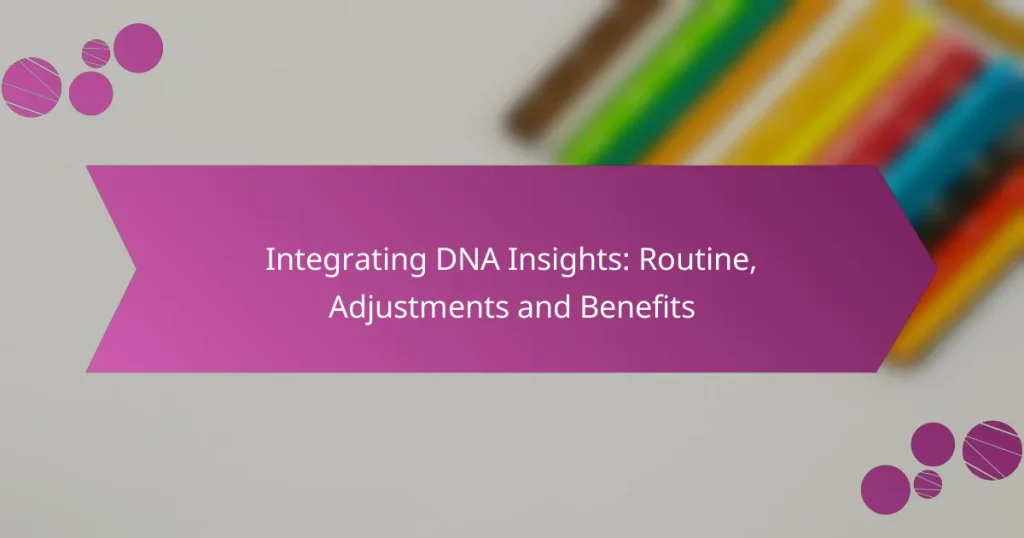Integrating DNA insights into daily health routines allows individuals to customize their diet, exercise, and health screenings according to their genetic makeup. By making specific lifestyle adjustments, such as modifying supplement intake and medication plans, one can align health strategies with genetic predispositions, ultimately enhancing overall well-being. This personalized approach not only promotes proactive disease prevention but also empowers individuals to make informed choices for optimal health management.
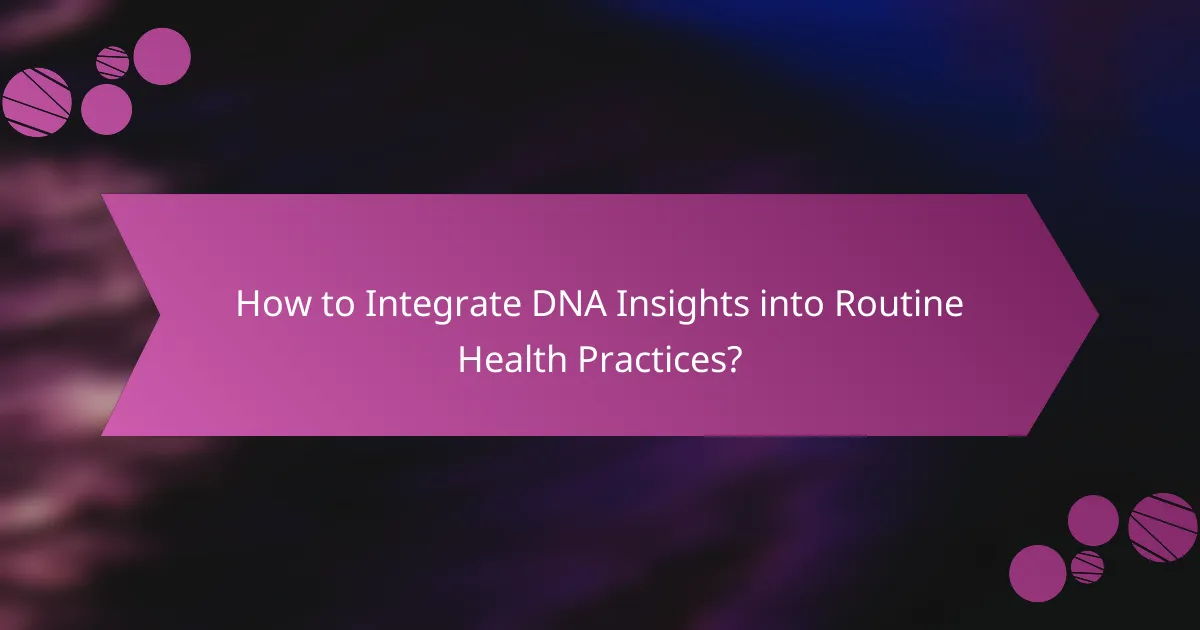
How to Integrate DNA Insights into Routine Health Practices?
Integrating DNA insights into routine health practices involves tailoring your diet, exercise, and health screenings based on genetic information. This personalized approach can enhance overall well-being and optimize health outcomes.
Daily dietary adjustments
Daily dietary adjustments based on DNA insights can help you make informed food choices that align with your genetic predispositions. For instance, if your genetic profile indicates a sensitivity to lactose, reducing dairy intake can improve digestive health.
Consider incorporating foods rich in nutrients that your DNA suggests you may need more of, such as omega-3 fatty acids or antioxidants. A practical tip is to aim for a balanced plate that includes a variety of colors from fruits and vegetables, ensuring you cover a broad spectrum of nutrients.
Personalized exercise regimens
Personalized exercise regimens can significantly benefit from DNA insights by aligning physical activity with your genetic strengths and weaknesses. For example, if your genetics favor endurance, focusing on aerobic activities like running or cycling may yield better results.
It’s essential to consider the intensity and type of exercise that suits your genetic makeup. A good rule of thumb is to incorporate both strength training and cardiovascular workouts, adjusting the frequency based on your recovery capacity as indicated by your DNA.
Regular health screenings
Regular health screenings tailored to your DNA insights can help detect potential health issues early. If your genetic profile shows a predisposition to certain conditions, such as high cholesterol or diabetes, scheduling more frequent screenings can be crucial.
Consult with your healthcare provider to establish a screening schedule that reflects your genetic risks. For example, if your DNA suggests a higher risk for heart disease, consider annual cholesterol and blood pressure checks, rather than the standard every few years.
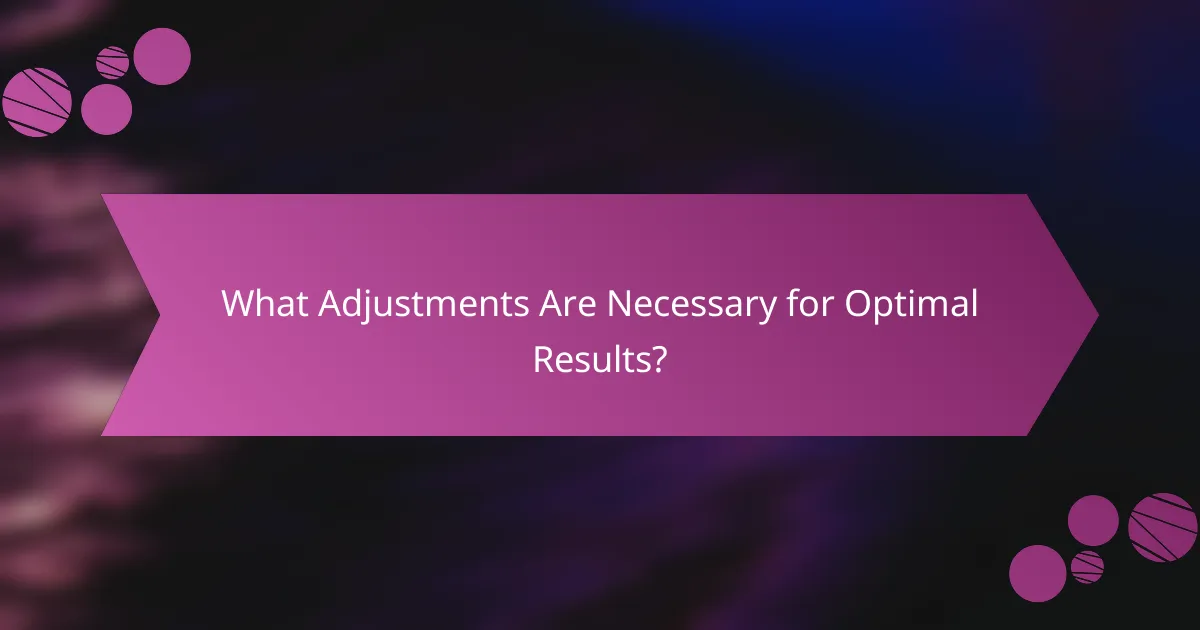
What Adjustments Are Necessary for Optimal Results?
To achieve optimal results from DNA insights, individuals must make specific adjustments in their lifestyle, supplement intake, and medication plans. These changes help align personal health strategies with genetic predispositions, enhancing overall well-being.
Modifying lifestyle choices
Adjusting lifestyle choices is crucial for maximizing the benefits of DNA insights. This may include changes in diet, exercise routines, and sleep patterns based on genetic recommendations. For example, someone with a genetic predisposition to high cholesterol might benefit from a diet rich in omega-3 fatty acids and fiber.
Consider incorporating regular physical activity that aligns with your genetic strengths, such as endurance training for those predisposed to better aerobic performance. Additionally, prioritizing sleep hygiene can significantly impact health outcomes, particularly for individuals with genetic markers indicating sleep disturbances.
Adapting supplement intake
Tailoring supplement intake based on DNA insights can enhance nutrient absorption and overall health. For instance, individuals with genetic variations affecting vitamin D metabolism may need higher doses of this vitamin to maintain optimal levels. Consulting with a healthcare provider can help determine the right supplements and dosages.
It’s essential to monitor how these adjustments affect your health. Keeping a journal of your supplement intake and any changes in well-being can provide valuable feedback for further refinement.
Tailoring medication plans
Adjusting medication plans according to DNA insights can lead to more effective treatments and fewer side effects. Pharmacogenomics, the study of how genes affect a person’s response to drugs, can guide these modifications. For example, individuals with specific genetic markers may metabolize certain medications more slowly, necessitating lower doses.
Before making any changes to medication, it’s crucial to consult with a healthcare professional. They can provide guidance on how to adjust dosages or switch medications based on genetic insights, ensuring safety and efficacy in treatment plans.

What Are the Key Benefits of Using DNA Insights?
Using DNA insights offers significant advantages for health management, including personalized health monitoring, proactive disease prevention, and tailored wellness strategies. These benefits empower individuals to make informed lifestyle choices based on their genetic predispositions.
Enhanced health monitoring
Enhanced health monitoring through DNA insights allows individuals to track their health metrics more effectively. By understanding genetic markers, people can identify potential health risks and monitor changes over time. This proactive approach can lead to earlier interventions and better health outcomes.
For instance, individuals with a family history of certain conditions may choose to undergo regular screenings or lifestyle adjustments. Utilizing DNA insights, they can prioritize specific health metrics that align with their genetic profile, ensuring a more focused monitoring strategy.
Improved disease prevention
Improved disease prevention is a crucial benefit of integrating DNA insights into health routines. By analyzing genetic data, individuals can gain insights into their susceptibility to various diseases, allowing them to take preventive measures. This can include lifestyle changes, dietary adjustments, or increased frequency of medical check-ups.
For example, someone with a genetic predisposition to heart disease might adopt a heart-healthy diet and exercise regimen earlier than they would without such knowledge. This proactive stance can significantly lower the risk of developing serious health issues.
Customized wellness strategies
Customized wellness strategies are made possible through the application of DNA insights, enabling individuals to create personalized health plans. These strategies can encompass nutrition, exercise, and mental health practices tailored to one’s genetic makeup. This level of personalization can enhance the effectiveness of wellness initiatives.
For instance, a person with a genetic inclination towards lactose intolerance might benefit from a dairy-free diet, while someone with a higher metabolism could focus on high-calorie intake for muscle gain. By aligning wellness strategies with genetic insights, individuals can optimize their health outcomes and overall well-being.

How Do DNA Insights Compare to Traditional Health Assessments?
DNA insights provide a more personalized approach to health assessments compared to traditional methods, which often rely on generalized data. By analyzing genetic information, individuals can receive tailored recommendations that address their unique health risks and needs.
Precision vs. generalization
Traditional health assessments typically use broad population averages to evaluate health risks, which may not accurately reflect an individual’s specific situation. In contrast, DNA insights focus on genetic predispositions, offering precise information about potential health issues that may not be evident through standard assessments.
This precision allows for more targeted interventions. For example, someone with a genetic marker for a certain condition can receive proactive measures, while others without that marker may not need the same level of scrutiny.
Data-driven decisions
DNA insights empower individuals to make informed health decisions based on their genetic data. This contrasts with traditional assessments that often rely on subjective evaluations and general health trends.
By leveraging genetic information, individuals can prioritize lifestyle changes, screenings, and preventive measures that align with their unique genetic profile. This data-driven approach can lead to more effective health management strategies.
Long-term health outcomes
Integrating DNA insights into health assessments can significantly improve long-term health outcomes. Personalized recommendations based on genetic data can lead to early detection and prevention of diseases, ultimately enhancing quality of life.
For instance, individuals informed about their genetic risks for conditions like diabetes or heart disease can adopt lifestyle changes earlier, potentially reducing their risk by substantial margins. This proactive approach contrasts with traditional assessments, which may only identify issues after they arise.
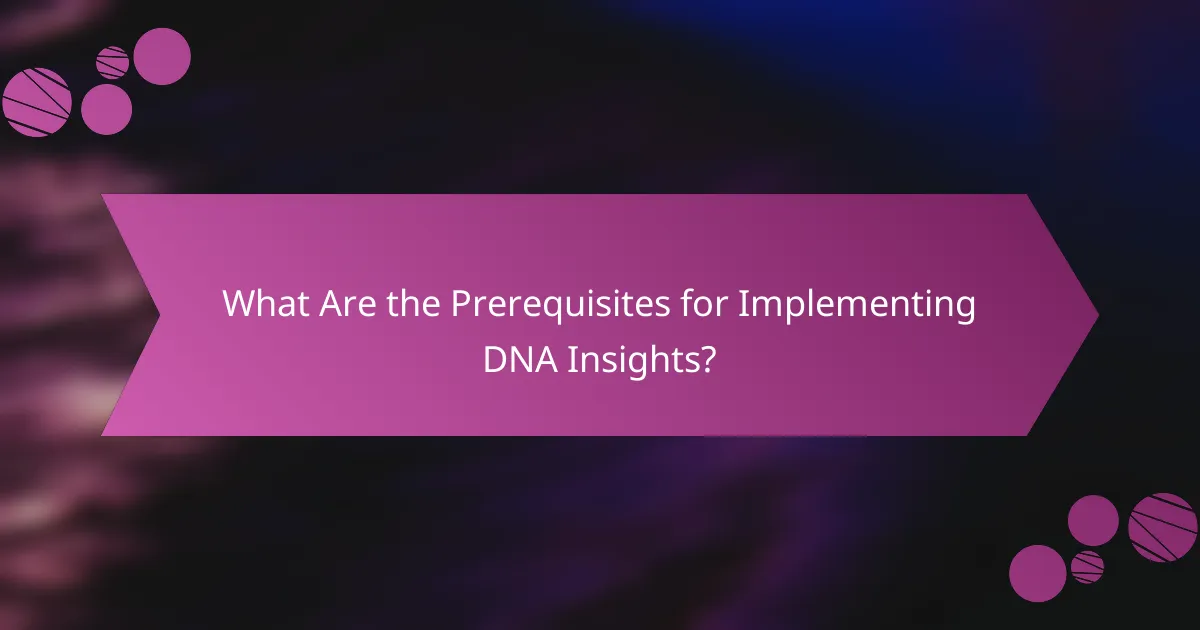
What Are the Prerequisites for Implementing DNA Insights?
Implementing DNA insights requires a few essential prerequisites, including access to genetic testing, a solid understanding of genetic reports, and consultation with healthcare professionals. These elements ensure that individuals can effectively interpret and utilize the information derived from their genetic data.
Access to genetic testing
Access to genetic testing is the first step in integrating DNA insights. Individuals should seek reputable laboratories that offer a range of tests, from ancestry analysis to health risk assessments. Many tests are available online, but it’s crucial to choose those that comply with local regulations and standards.
Costs for genetic testing can vary widely, typically ranging from a few hundred to over a thousand USD depending on the complexity of the test. Insurance coverage may also differ, so checking with providers about reimbursement options is advisable.
Understanding genetic reports
Understanding genetic reports is vital for making informed decisions based on DNA insights. These reports often include information about genetic variants, potential health risks, and traits. Familiarity with common terminology and concepts, such as SNPs (single nucleotide polymorphisms) and penetrance, can enhance comprehension.
Many genetic testing companies provide educational resources or guides to help users interpret their results. It’s beneficial to focus on actionable insights rather than getting overwhelmed by technical details.
Consultation with healthcare professionals
Consultation with healthcare professionals is essential for effectively integrating DNA insights into personal health strategies. Genetic counselors or healthcare providers can help interpret genetic reports and discuss implications for health and lifestyle. They can also assist in identifying relevant preventive measures or treatments based on genetic predispositions.
When seeking professional advice, look for specialists with experience in genetics and personalized medicine. This ensures that the guidance received is tailored to individual needs and circumstances, maximizing the benefits of DNA insights.
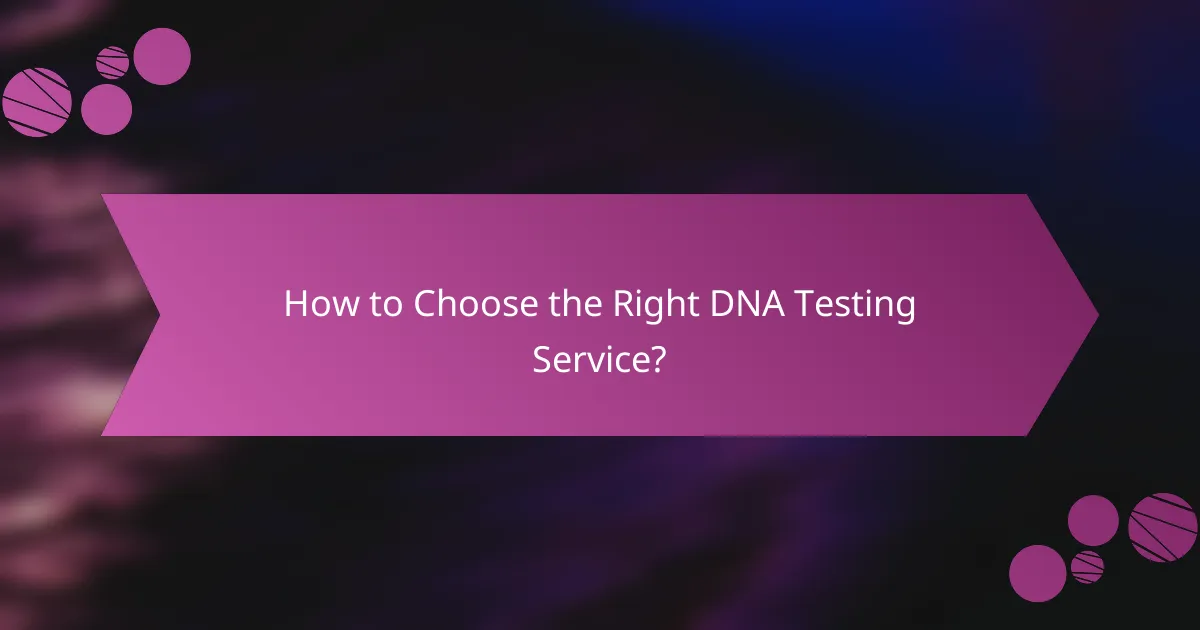
How to Choose the Right DNA Testing Service?
Selecting the right DNA testing service involves evaluating factors such as the type of tests offered, privacy policies, and customer reviews. Consider what you want to learn from the test, whether it’s ancestry, health insights, or both, and ensure the service aligns with your needs.
Types of DNA Tests Available
Privacy and Data Security
Cost and Value
Customer Reviews and Reputation
